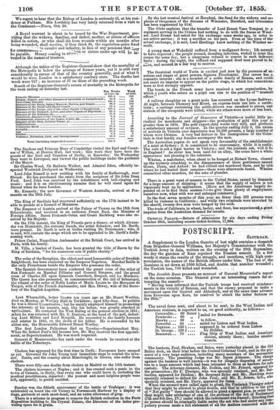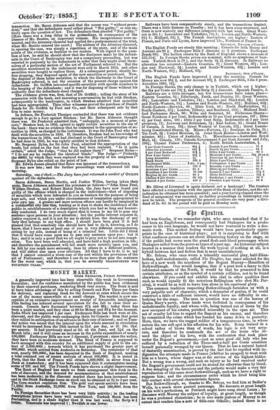The bankers, Paul, Strahan, and Bates, were yesterday placed in
the Old Bailey dock, on their trial before the Central Criminal Court, and in the Pee- Bence of a very large audience, including many members of the mereantate community. The presiding Judge was Mr. Baron Alderson. The charge against the bankers is well known—it was for illegally disposing of securi- ties to a large amount which had been intrusted to them as bankers for safe custody. The Attorney-General, Mr. Bodkin, and Mr. Poland, appeared for the prosecution ; Sir F. Thesiger, who was specially retained, and Mr. Bal- lantine, appeared for Strahan ; Mr. Sergeant Bytes and Mr. Hawkins were specially retained to defend Sir John Paul; and Mi. E. lames, Q-C., 812° specially retained, and Mr. Parry, appeared for Bates. When the accused were called upon to plead, Sir Frederick Theaiger asked that they might be allowed to plead double, and that in addition to the plea of " Not guilty" they should be allowed to plead a special plea, in order that they might tae advantage of one of the sectione of the Act of Parliament (7th and 8th Geo. IV.) under which the indictment was framed; directing that no person should be criminally liable under the act who had midez any com- pubiory process made a full statement of all the matters connected with the transaction. Mr. Baron Alderson said that the course was "without prece- dent," and that the defendants must either plead "Not guilty," or rest en- tirely upon the question of law. The defendants then pleaded "Not guilty." [Here there was a long delay in the proceedings, in consequence of the absence of Mr. Beattie, an important witness. His recogruzances were es- treated, and the Attorney-General had applied for a postponement of the trial, when Mr. Beattie entered the court.] The address of the Attorney-General, in opening the case, was simply a repetition of the story, and of the main points of the evidence, so familiar to our readers. With regard to the ques- tion of law, he said he should show that the disclosure made by the defend- ants in the Court of Bankruptcy was not a compulsory proceeding, but was resorted to purposely by the defendants in order that they might avail them- selves of a particular section of the act of Parliament referred to. But the securities mentioned in the indictment were sold in March 1854, and other securities were bought to replace them. At a subsequent period, shortly be- fore stopping, they disposed again of the new securities so purchased. Now, the disposal of these latter securities, to which the disclosure in the Court of Bankruptcy referred, is not the occasion of the present charge against the defendants. Dr. Griffith intrusted specific securities with specific numbers to the keeping of the defendants ; and it was for disposing of these without his authority that the defendants stood charged.
The evidence given was, first, that of Dr. Griffith ; telling the story of his eonnexion with the bank, and narrating a conversation he had with Strahan, subsequently to the bankruptcy, in which Strahan admitted that securities had been appropriated. Then other witnesses proved the purchase of Danish Bonds for Dr. Griffith by Paul and Co., and their subsequent sale by that firm to raise money. In defence, Sir Frederick Thesiger contended that there was not evidence enough to go to a Jury against Strahan : but Mr. Baron Alderson thought there was. Sir Frederick admitted that, "unhappily, in a moment of pres- sure," Strahan had, in 1855, agreed to apply certain securities to the use of the bank : there was no evidence that he consented to the appropriation of se- curities in 1854, as charged in the indictment. It was Sir John Paul who had dealt with the securities in 1854. If, therefore, Strahan had no knowledge of the transactions in 1854, and had disclosed to the Court of Bankruptcy what he had done in 1855, he was rightly entitled to that defence.
Mr. Sergeant Bylea, for Sir john Paul, admitted the appropriation of the bonds, but relied on the fact that they had been replaced. "Is it quite certain," asked the Judge, "that he did replace them ?" Sergeant Byres—
"I do not say he replaced the identical bonds." The Judge— Probably the 5000/. by which they were replaced was the property of his assignees ?" Sergeant Bytes also relied on the point of law. Mr. Edwin James pleaded that Bates was ignorant of the transactions. It was now late ; and the further proceedings were adjourned till this morning.
Saturday, one o'clock.— The Jury have just returned a verdict of GIILLTY against all the defendants.
Baron Alderson, Baron Martin, and Justice Wilke, having taken their seats, Baron Alderson addressed the prisoners as follows—" John Dean Paul, William Strahan, and Robert Makin Bates, the Jury have now found you guilty of the offence which is charged in the indictment—that of disposing of securities which were intrusted to you as bankers for the purpose of being kept safe, and which you under circumstances of temptation appropriated to your on use. A greater and more serious offence can hardly be imagined in a cor-iimettlal city like this, tending as it does to shake the confidence of the public in establishments of a description which you had so long and honour- ably conducted. I do very much regret that it comes to my lot to pass any sentence upon persons in your situation; but the public interest requires it, justice requires it, and it is not for me to shrink from the discharge of any duty that belongs to my high office. I should have been glad if it had pleased God that somebody else should have had to do it, knowing, as I do know, that I have seen at least one of you in very different circumstances, sitting by my side, instead of being at a criminal bar. Little did I think that it would have come upon me to pass any sentence upon you : but it has; and it is only a proof that we all ought to pray not to be led into tempt- ation. You have been well educated, and have held a high position in life ; and therefore the punishment will fall much more severely upon you, and be felt by you much more seriously', than by others in a different position,
and will reflect also u i
upon your relations. All that I have to do s to say that I cannot conceive a worse case of the sort within the provisions of the act of Parliament; and therefore I can do no more than pass the sentence for the worst case, which is, that you be severally TRANSPORT= on FOURTEEN YEARS."



























 Previous page
Previous page